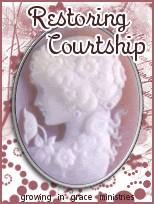
I know, it's been awhile since the last post. Summer has been busy and gone way too fast! I hope you are all enjoying the warmer weather and the fun times this season brings with it. A couple months ago I read
The Tenant of Wildfell Hall by Anne Bronte, and I've been waiting for the chance to sit down and share my thoughts on it. I was
very surprised that I loved this book so much, because the Bronte sisters have a style that leans more toward the morose, depressing side. While
The Tenant of Wildfell Hall is very dark in some parts, it also contains many Biblical truths and deals with a situation we girls can really learn from. I'd LOVE for all of you to go out and read the book, so let me warn you now, I'm going to be giving away some spoilers in the next few paragraphs (but not too many I hope!).
Let's begin with Gilbert Markham, a simple farmer with a cozy country family. He lives with his mother, sister Rose, and impish brother Fergus. He has no doubt in his mind that he will marry the pretty but spoiled and selfish Eliza Millward, the daughter of the town's pastor. That is, until the mysterious widow Helen Graham and her son move into Wildfell Hall-a secluded old home in the town. Soon the young widow becomes the target of speculation and gossip as the townspeople attempt to figure out her past before she moved into the Hall. Gilbert is immediately turned off by Helen's stiff and severe personality. Trying to befriend her young son, Arthur, he notes how over-protective she is of him and goes to great lengths to keep him out of society. An accomplished artist, Helen Graham makes her living in the world by painting beautiful landscapes-but all these are painted under an alias.
By winning the trust of little Arther, Gilbert slowly begins to find a place in the heart of the mysterious Mrs. Graham. Soon the shallow Eliza Millward means nothing to him as he finds himself taken in by Helen's deep thoughts and character. Although the two define their relationship as a brother and sister, Gilbert begins to feel much more for Helen, and attempts to tell her of these new feelings. Everytime the subject is brought up, she expresses how impossible it is for them to even think such thoughts, leaving Gilbert curious and perplexed. Another mysterious person in the plot is Mr. Lawrence, the landlord of Wildfell Hall, and a much too frequent visitor at the place. As nasty rumors begin to spread about Helen Graham's past, Gilbert is the first to rise to her defense. However, a confusing circumstance leads him to believe the worst of her, and he to forsakes her.
Unfortunately, Gilbert makes some serious mistakes and acts out of anger and even violence. Helen confronts him with his strange and sudden behavior, and as he expresses what he believes is the truth, she gives him a window into her past life-her very detailed journal. What Gilbert finds in Helen's diary surprises him very much, and more than 50% of
The Tenant of Wildfell Hall consists of her journal entries until the last few chapters. It sounds like this would be boring, but it's not. It's so intriguing learning about Helen's life from her viewpoint (the first and last part of the book is from Gilbert's) that I found it hard to put the book down!
*Some spoilers ahead, but I'll try not to be too detailed!*
As Gilbert sits down to read this very long narrative, he is introduced to a very young Helen. She lives with her aunt and uncle because her mother is dead and her father is too busy to raise her. Helen also tells us that she has a brother, but they to live in different locations. Being somewhat close to her aunt, Helen has meaningful conversations with her, especially ones about marriage. Her aunt asks her if she ever thinks about matrimony, and Helen responds that she does, but thinks there are very few men that she should like to marry. Although Helen's aunt is not perfect and does not always choose the best suitors for her, she gives some sound advice.
(To Helen)"Keep a guard over your eyes and ears as the inlets of your heart, and over your lips as the outlet, lest they betray you in a moment of unwariness...First study; then approve; then love."-Helen's aunt.
(To her aunt)"I know there is truth and sense in what you say; but you need not fear me, for I not only should think it wrong to marrya man that was deficient in sense or in principle, but I should never be tempted to do it; for I could not like him, if he were ever so handsome, and ever so charming, in other respects...So set your mind at rest."-Helen.
However, one man enters Helen's life and turns it upside down. He is the young and charming Arthur Hungtingdon, who steals her heart and dismisses all her previous thoughts on men who are "deficient in sense and principle". At parties and social events, Arthur Hungtingdon shows Helen profuse attention, which flatters her even more. Helen's aunt begins to fear this young man's attentions, and continues in her warnings to her niece.
"Do you remember, Helen, our conversation the night but one before we left Staningley?"
"Yes, aunt."
"And do you remember how I warned you against letting your heart be stolen from you by those unworthy of its possession...and did you you not say that your affection must be founded on approbation; and that unless you could approve and honour and respect, you could not love?"
"Yes, but I do approve, honour, and respect---"
"How so, my dear? Is Mr. Hungtingdon a good man?"
"He is a much better man than you think him."
"Is he a good man?"
"Yes--in some respects. He has a good disposition."
"Is he a man of principle?"
"Perhaps not, exactly; but it is only for want of thought: if he had some one to advise him, and remind him of what is right."
Does any of this conversation sound familiar to you? Have you heard friends who have said this, or have you yourself spoken words similar to these? It's funny how our past ideas on relationships can change when a young man enters into our lives. Helen is absolutely glowing in the attentions of Mr. Hungtingdon. Believing herself to be in love, she thinks she can change all of Arthur's imperfections and impish bevavior.
Arthur Hungtingdon continues to pursue Helen, but teases her cruelly by pretending to be in love with someone else. She is hurt by his fickle attentions, but it's a clear warning to her as well. However, Helen doesn't take this as a warning when Arthur declares his love for her and asks for her hand in marriage. Overwhelmed with joy and happiness, Helen says she will accept if her uncle and aunt approve. They do eventually permit the match, although Helen's aunt is still wary of Arthur. He agrees to go to church with the family, and Helen delightedly takes this as a sign of spiritual maturity (even though he scribbles on his note pad through most of the sermon). Another warning bell goes off for Helen when Arthur reveals his true character. In a conversation with her, he unashamedly refers not only to gambling, but to leading his friend to drowning his sorrows in drinking alcohol. Helen is appalled and begins to rethink her decision, but still decides to marry Arthur.
After her marriage to Arthur, Helen is happy and content, but reveals that he is not the young man she thought him at first. He is wilful, conceited, and used to getting his own way. Helen, blindly in love, strives to please him. After a few more months, Arthur begins to show more of his true colors as he grows tired of the country life. He teases Helen unmercifully and shows immaturity, and the procession only goes from bad to worse. His so-called friends are drunks and lazy, and Helen has to put up with their visits from time to time. The next couple of years are absolute misery for her, and even the bearing of their son does nothing to bring them closer as husband and wife.
There is so much more I could write, but I know I've already written more than I had planned! So I will stop here, and even though I have revealed much of the plot, there is SO much more to the story, and I really encourage you to get a copy from the library. Throughout
The Tenant of Wildfell Hall, I couldn't help but think how so many girls today make this very same mistake when they marry men whom they claim they can change after the marriage. As girls we have to be so careful, because we are more weak and vulnerable when it comes to our emotions. It's so easy to say that we'll be strong and able to resist a handsome man who shows romantic interest. Do you struggle with this? Sometimes I do, especially when I was younger. Helen had plenty of warning, but she still insisted upon marrying Arthur, and she was miserable for it later on. What I really loved about Helen though was her constant trust and faith in God. Although she didn't make very wise choices at the beginning, Helen knew that she could lean on Him through these trials.
Toward the end of the book, after Arthur has read Helen's journal and goes to visit her, he repents of his misconduct and begs her forgiveness. He still feels a romatic attraction to her, but Helen knows how wrong it is for her to give her love to him. At this point she thinks it is impossible for them to ever be together except in Heaven, but Gilbert is heartbroken and can't even bear the thought. Helen gives a beautiful illustration to him to make him better understand from her point of view.
"I do know that to regret the exchange of earthly pleasures for the joys of Heaven, is as if the grovelling caterpillar should lament that it must one day quit the nibbled leaf to soar aloft and flutter through the air, roving at will from flower to flower, sipping sweet honey from their cups, or basking in their sunny petals. If these little creatures knew how great a change awaited them, no doubt they would regret it; but would not all such sorrow be misplaced?"
This is one of my favorite quotes in the book; it shows how strong Helen's faith is even when she is feeling deep sorrow. It very much reminds me of Jane Eyre when she is explaining to Mr. Rochester why she cannot be with him after finding out about his wife. These are strong character traits that I hope I can show when faced with a difficult decision. When I first picked up this book from the libary, I never thought it would make me think so much. Out of all the Bronte sisters, I knew the littlest about Anne, but now I am excited to check out her other works. So girls, if you're looking for yet another book to add to your reading list this summer, add
The Tenant of Wildfell Hall. You won't be disappointed. I hope you like it as much as I did, and I'd love to hear from you if you have read it or plan to!
Love in Christ,
Sara










